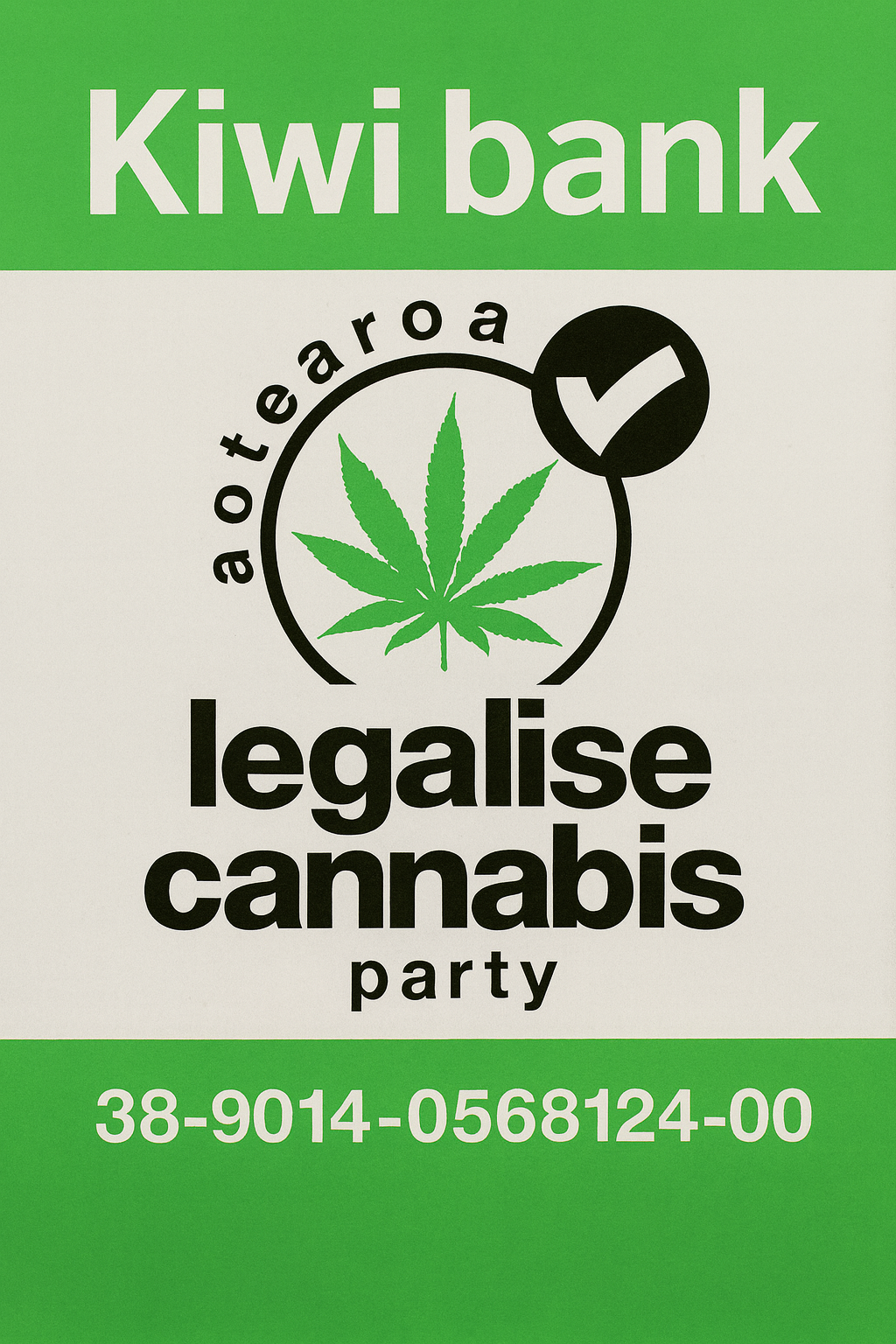
FULL SPECTRUM POLICY - ALCP
(developed 2005 Irinka Britnell, Paula Lambert, Kevin O’Connell)
Our party proposes a holistic, common-sense solution to pollution, economic waste, ill-health and social injustice. ALCP advocates social ecology- creating a harmonious community environment, with cannabis/hemp as an integral resource.
Principles that underpin our policy include
- Equity (fairness and proportionality in law)
- Efficiency (including cost-effectiveness),
- Harm reduction (acknowledging that use of recreational drugs is a widespread reality in NZ), and
- Upholding of individual and civic rights where these do not unreasonably impinge on others.
- Full inclusion of Treaty of Waitangi principles
POSITIVE PROGRESS FOR NEW ZEALAND:
Our policy will:
• redirect hundreds of millions of taxpayer dollars from maintaining unworkable and discriminatory laws. The money will be redistributed to sectors of need, eg Community, Health, Education and Employment.
• improve access to health services and greatly increase credibility of drug education by removing double standards.
• deglamorise cannabis (forbidden fruit), decrease availability to adolescents, improve health promotion generally.
• cut crime and restore law and order and respect for rule of law, and an increase in police and court resources to fight serious crime.
• encourage community participation, and set a new standard for good governance.
• boost the economy via cannabis commerce, create employment and more tax by developing hemp industry.
• be of immeasurable benefit ecologically - full-scale hemp cultivation will save forests, reduce pollution and greenhouse emissions, and provide for the basics of life – food, shelter, clothes, fuel and medicine.
POLICY MINIMUM PROGRAMME
• That the possession, cultivation and use of pure cannabis and cannabis/hemp (added) products be free from prosecution.
• That provision be made to establish regulated R18 cannabis commerce, like alcohol and tobacco, but with no promotional aspects. (Policy Council fine tunes ‘best practice’).
• That provision be made to establish therapeutic (medicinal) applications of cannabis.
• Enable full-scale cannabis-hemp production and utilization. A high priority be given for the localized production of low-cost biofuels from cannabis biomass and as a source of fiber and hurds.
• That provision be made to expunge all cannabis convictions.
-------------------------------------------------
1/ Justice
• Up to 20,000 people are convicted for cannabis offences every year in NZ. The unemployed, males and Maori are especially penalized by the law as it stands (Fergusson et al, CH&DS).
• ALCP recognises the duty of Parliament to challenge injustice, and to break down prejudice and division. The Party advocates a full Prohibition ‘truth and reconciliation’ Commission in the interests of accountability and (take out) restorative justice.
2/ Education
• Money turned from prohibition costs could go into health and education. “Education not incarceration”.
• We must more effectively discourage drug use amongst minors. R18 regulation with education will deglamorize teen use.
• Effective anti-drug education is impeded by the existing law. The current double standards-based system alienates and fails our young people. Our policy will enable a non-threatening educational environment. Our schools and learning institutions should have an honest and credible basis for communication, without fear or prejudice.
• Our policy specifies “adults only” with consistent enforcement. ALCP advocates implementation of a tobacco, alcohol and cannabis authority (Drugs Policy Council) to control and develop an optimum regulatory framework for recreational substances, focusing on community involvement and awareness, and credible information about health and wellbeing.
3/ Health
• Follow harm reduction principles and evidence on best practice. specifies "adults only" regulation (R18).
• Credible drug education will focus on harm reduction to minimize any use-related harm. Removal of double standards will greatly assist health promotion in general. Double standards currently impair the credibility of public health promotion.
ALCP endorses the 1998 Health Select Committee Inquiry into the Mental Health Effects of Cannabis, unanimously concluded that ‘based on the evidence received, we recommend that the Government review the appropriateness s of existing policy on cannabis use and reconsider the legal status of cannabis.’
The subsequent ‘Effective Cannabis Health Strategies and Legal Status’ inquiry (2000-2003) could find nothing good about prohibition, but MPs avoided resolution of cannabis ‘legal status’.
• Our policy provides for home grown medicinal marijuana, as well as prescribed therapeutic cannabis preparations. Legalising will promote safe-use modes such as vaporization and mouth sprays.
• Our policy will put hemp seed on the menu. Cannabis/hemp seed is THC free. The seed is nature's most nutritious food source, rich in goodness, complete and balanced, providing essential fatty acids Omega 3, 6 and 9, plus vitamins and minerals.
• ALCP policy re-introduces cannabis hemp for an organic and pollution free environment and embraces the concept of clean and green “natural order.” Having cannabis-hemp in the marketplace means ecologically sustainable uses such as biofuel, paper, plastics, biodegradable packaging, and food from the THC-free and nutritionally rich seed.
4/ Welfare
• Legal regulation of cannabis will enable people to make positive, responsible lifestyle choices. Under the current system the alienation factor actually facilitates the dropout lifestyle, i.e. ... non-participation in the community.
• The hemp industry will provide employment incentives, especially in economically depressed areas of New Zealand where black-market cannabis is currently entrenched.
5/ Economy
• Prohibition is responsible for a very big black market in NZ. Globally the illicit drug market is estimated by the World Health Organisation to be as large as $500 Billion per year. Under a regulatory regime, those hundreds of millions of dollars currently misdirected to NZ prohibition interests - eg. law enforcement on the one hand and untaxed organised crime on the other - will be positively circulating in the community.
• Legal cannabis commerce, (but without the promotional aspects of alcohol and tobacco), will create substantial economic benefits, eg. taxation revenue, carbon credits.
• Cannabis agriculture for non-drug hemp products will provide employment and economic growth. This is impossible under current prohibition policies.
6/ Family
• Families are divided and relationships compromised by prohibition law. Official surveys indicate that, on average, every family in NZ has a cannabis user. Tens of thousands of otherwise law-abiding parents are cannabis consumers facing a difficult situation which can seriously hinder trust and honest communication within the family.
• Prohibition manufactures distrust and, in extreme cases, mate wairua (sickness of the spirit) within New Zealand families. The double standard is damaging our young people because it has broken down the trust they might otherwise have in the system. Cannabis-related harms will be reduced under a system of legal regulation.
• ALCP’s grow your own model would allow families to take responsibility with all drugs, and replace youth mistrust with mutual community respect. Parents will be empowered with credible information to equip their children to cope with peer influence about drugs.
7 Law and Order
• ALCP has the strongest law and order policy, because unlike the other parties we address both the black market status of cannabis, as well as the absolute failure of prohibition to limit supply and demand. With R18 legalisation NZ can expect a dramatic (take out) decrease in crime and fear in the community because of a return to credible, workable law.
• By definition, criminalisation is self-perpetuating. It is creating crime, criminals and criminality on an unprecedented scale. Reliable research indicates there are as many as half a million consumers in NZ. Respect for rule of law has been compromised and dangerously eroded by this hypocritical and unsubstantiated criminal status.
• By taking the criminality out of NZ’s most popular and prevalent illicit substance, police will be considerably freed up to contain and prevent real crime.
• Legal regulation will rebuild community tolerance, trust and respect. It will greatly reduce the fear-factor. Money currently misappropriated into crime creation via drug-law enforcement will be much better spent in the health and education sectors.
• Legalising cannabis will create an environment where people are far more able and willing to co-operate with police.
8/ Immigration
• The Party has no particular position on immigration other than stating our general philosophy of inclusiveness and tolerance. Cannabis offences in other jurisdictions should not be a barrier to people wishing to make a new life in NZ. The Shier deportation case (1999) exposed cruel injustice of this current restriction.
9/ Treaty of Waitangi
• ALCP supports principles of partnership, tolerance and co-operation underpinning the treaty. The Treaty is acknowledged and supported in the Party’s foundation documents, March 1996. Legal regulation policy promotes equitable law, self determination, and ‘capacity building’ for all.
• Disproportional treatment pushes young Maori into alienation and criminality. The law discriminates against Maori who are statistically 4 or 5 times more likely to be convicted for a cannabis offence than non-Maori, even though use of cannabis is at more or less the same level.
10/ Defence
• Organised crime and terrorism are aided and abetted by the international War on Drugs. Ending the NZ drug war on cannabis would be the single most important step we could take toward a safer world. Our policy will re-allocate resources to strengthen our border security and civil defence.
11/ Environment and Energy
• Hemp’s bulk fibre can be utilised for building materials, clothing, paper, plastic, textiles and notably as a renewable bio-fuel energy source. With cellulose yields greater than corn, maize and soya, cannabis-hemp provides an environmentally efficient resource in the age of ‘peak oil’ and climate change.
• The crop also has drought and pest resistant properties. It is useful in preventing erosion, and soil amelioration in dairy farming (the principle contaminant of NZ groundwater is nitrate, which deep rooting hemp captures and renders bio-available).
• Large scale reintroduction of hemp will help minimise greenhouse emissions, pollution, waste (eg. biodegradeable packaging), and save forests.
-------------------------------------------------------
2020 - REFERENDUM BILL IMPROVEMENTS WERE SUGGESTED AND ADOPTED IN PRINCIPLE
Under discussion and in progress (Cannabis Party policy/philosophy)
Cannabis Party envisions a Cottage Industry (compatible and workable within the proposed Cannabis Legalisation & Control Bill):
* Age restriction more consistent with alcohol and tobacco
(ALCP policy) Balance would be best, "level playing field". a more realistic, fairer way to go.
* Affordable micro licenses for existing Kiwi growers including Green Fairies
* Full expungement of convictions (ALCP policy).
Apologies must be made for Injustices of Prohibition
* Full inclusion of Kiwi knowhow, skills and product
* safe provision of edibles including medicinal herbs and salads
* Kiwi strains of cannabis seed for all growing and nutritional and Medicinal purposes,
including tinctures balms etc.
* Full range of quality-controlled retail product with your preferred mix of THC and CBD
content.
* Bare minimum 5 plant per household model or more as deemed reasonable
* Protection against racially loaded enforcement of regulations and more amendments we haven't thought of yet feedback welcome.



